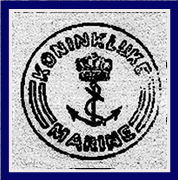
DUTCH INDONESIAN MEMOIRS 1941 - 1948
MLD Marine Luchtvaart Dienst
or
DNAS Dutch Naval Air Service
KONINKLIJKE LUCHTMACHT Netherlands Royal Air Force
HANGER 6 Naval Airstation Morokrembangan
Page 1. THE NEW CADETS FRANK RUGEBREGT
August 10, 1941, Frank Rudebregt and his father went to the naval base in Goebeng Surabaya. At the gate they said goodbye and Frank went inside to sign up. He was 15 years old.
At naval barracks Goebeng Surabaya, sixteen days later, leaving his mother and his brother Geert alone, Robert Hartman Kok like his two his elder brothers before, signed up. He was 17 years old.
THE WORLD AT WAR
May 10, 1940, The Germans bomb cities without warning. The Netherlands surrenders in five days. The royal family and the cabinet escape and set up a government in London. Some vessels of the Dutch navy escape and help patrol the Allied supply lines.
In the largest Dutch colony, Indonesia, training academies for the Army, Navy and Naval Air Force are opened at Surabaya and Bandung.
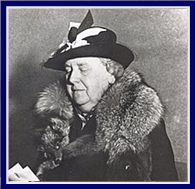
Queen Wilhelmina Radio Orange 1940
June 22, 1941, Germany invades the Soviet Union. Italy also declares war on Soviet Union.
July14, 1941, French Vichy Government sign armistice with Germany.
July 21, 1941, French give military control of Indochina (Vietnam) to Japan.
July 25, 1941, United States and Britain freeze Japanese assets.
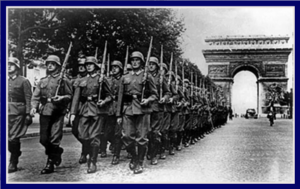
German troops enter Paris
August 1, 1941, United States bans gasoline export to Japan.
August 6, 1941, Germans capture Smolensk, in Soviet Union.
August 14, 1941, Roosevelt and Churchill announce the Atlantic Charter.
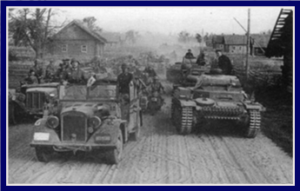
German troops invade Russia
September 11, 1941, Roosevelt orders Navy to fire on Axis raiders in American defence zones.
September 19, 1941, Germans takes Kiev in the Soviet Union.
October 11, 1941, United States Navy announces capture of German radio station in Greenland.
October 16, 1941, Germans take Odessa. Japanese "moderate" Prime Minister Prince Fumimaro Konoye resigned.
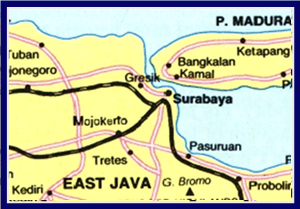
East Java & Madura
October 18,1941, General Hideke Tojo appointed premier of Japan.
October 19, 1941, Moscow declares state of siege.
October 24, 1941, Khar'kov falls to Germans.
October 31, 1941, U-boats sink United States destroyer Reuben James off Iceland.
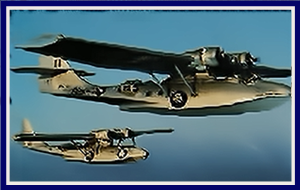
American PBY's
November 1941, Japanese naval ships move towards Hong Kong, Indochina and Malaysia.
November 17, 1941, Neutrality Act amended to arm American merchant ships.
November 20, 1941, Japanese envoys submit "last proposals" to United States.
November 26, 1941, Japanese carrier group I and II ordered to sail for Pearl Harbour from Tankan Bay in Kurile Islands.
November 26, 1941, United States proposes economic cooperation to Japan.
November 29, 1941, America asked to meet all Japanese demands for free hand to expand into south into the East Indies.
November 31, 1941, Japanese Carrier group I and II plus 24 escort ships actually leave Tankan Bay in secret for Pearl Harbour.
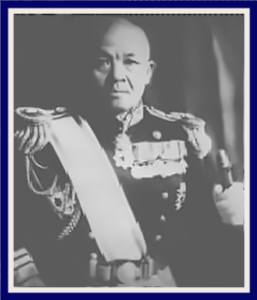
Admiral Chuichi Nagamo
December 1, 1941, Admiral Nagamo receives orders to Attack Pearl Harbour.
December 4, 1941, Japanese carrier group now the 1st air fleet refuel south of the Aleutian islands. Fleet consists of 6 carriers, 430 aircraft, 2 battleships, 3 cruisers, and 9 destroyers.
December 6, 1941, Roosevelt appeals to Hirohito to intervene for peace.
There were about ten other volunteers waiting inside the building and after preliminary registration and issuance of copies of contract, they were led to the barracks assigned a bed and warned not to wander all over the compound. Dinner was at five, after which Frank just hung around, smoked, and got acquainted with the other new recruits. They were all the same age group, fifteen and sixteen, who had all signed on for the apprentice program for aeronautics.
"Taps" sounded at nine, the smoking lamp went out at the same time along with the lights in the dormitory.
The following day reveille sounded at five thirty and breakfast was at six. This didn't bother Frank as he was used to getting up early. An hour later they were assembled and marched to a hall where the base commander, a vice admiral, welcomed them in the navy. He explained that after they had taken the oath, they would be the property of Her Majesty's Navy and fall under the navy rules and laws, which would be taught to them during basic training.
He ended with the question, "Is there is anyone who wishes to withdraw?" When nobody responded he continued with administering the oath of loyalty and allegiance.
Frank was now in the Navy, bound by a contract of nine years.
"I don't think that it really sank into us. All I realised was that I was now in the navy as an apprentice aircraft maintenance technician and that I was soon to start my training and get paid also".
Next, they were marched to the ships store and were issued work uniforms, shoes, caps, hammocks, and a sea bag and were told that upon return to the barracks they were to change into uniform, pack their civilian clothes, and in an hour to assemble outside to await transportation to the Naval Air Station "Morokrembangan".
"It is amazing how quick one gets the sense of discipline and order. Here we were just barely in uniform and already we lined up two deep, and roughly by height. and Boot camp hadn't even started yet"!!!
"We were loaded in trucks with our baggage, and a Marine lance corporal was put in charge, and off we went to the Naval Air Station, there were thirty-six of us".
On arrival Frank noticed that there were already other recruits to watch them unload and go through the motions of assignments. The thirty-six were lined up and separated into three sections of twelve. Each section was assigned a marine corporal as senior hand, who was responsible for the daily discipline and "well-being" of the group. After that they were assigned bunks and the marine corporal showed how the bunks had to be made up and what the daily routine orders were. It was then that Frank met Ben Portier who was to sleep on the lower bunk. He was to become his lifelong best friend.
"At five we had dinner and after that we had free time and we used that to organise our lockers, mark our clothing and get more or less organised. We were housed in the converted hangar 6 which was ideal, as it was airy and cool. Half of hangar 6 was dormitory, and the other half was mess hall and rec-room. In one corner of the rec-room was a canteen set up where we could buy soft drinks, cigarettes, toilet items and..... some other items".
The next morning right after breakfast everybody had to fall in by group number and each group was to be assigned its daily routine for classes and drill for the whole week. Boot camp had started!
The weeks following were filled with drills, drills, drills, the Queens orders, ranks and organisation, weapons theory and maybe one class a day in navy regulations. The first week everybody had blisters on his feet and hands, and at the end of the day were bushed, but soon they got used to the routine and life went on. Frank knew that after basic training he would go to regular technical classes. Such were those early days for the first class of aircraft maintenance technicians at the Surabaya Naval Air Station.
After four weeks of drilling and lectures their basic training was finished, they now only had to wait until Saturday evening, another five days before they could "go ashore" for their first liberty. Going ashore on liberty meant being able to leave the confines of the base for the first time and so in their newly issued dress uniforms the recruits waited for the "liberty boat". The "boat" in this instance was in the form of a bus especially for the apprentice classes. It left at five in the afternoon and the "sloop" returned at eight so they would be ready for Taps at nine.
"There wasn't much time to spend ashore that first night, and I only went to a Chinese restaurant and hung around town window- shopping. The bus stopped right downtown and at eight o'clock it came and we went back to camp. I noticed that there was a sign on the bus it said, "Hangar 6", and I thought, "Good, they don't have to know that we are only apprentices!"
Two weeks later he was allowed to spend a whole weekend ashore overnight but only with his family, as confirmation, his pass had to be signed by the head of the household. Though it may sound silly, one must not forget that all of them were still under the age of twenty-one and most like Frank were not even sixteen. Having obtained his travel pass and ticket for the ferry to Kamal which was across the strait in another city. He and a friend who was one of the old gang also from Kamal headed home on the first liberty boat at two o'clock.
How cocky they felt in their dress white uniforms, smoking the duty-free Lucky Strike's from the canteen instead of the local brands and Frank had a carton in his weekend bag for his mother.
He didn't recall what his parents said as he stepped into the house. It had been six weeks since he had been home. After changing into civilian clothes, they sat on the veranda having a cup of tea, and both parents just looked at him. He fidgeted around and finally reached in his pocket and took out five guilder and gave it to his mother. This was half of his first wages. His mother thanked him and said,
"Well! Now you're a man. Earning his own bread and supporting his mother".
It didn't worry Frank that now he only had 79 cents left until next payday and that was two weeks away.
"Long after the war my mother passed away in Holland, and when I went through her belongings. I found in her purse the first guilder that I had earned; it was one of the five I gave her way back in 1941".
Today it is framed and hanging above Franks' desk.
"The most exciting part of boot training I found was the rifle range. My father had taught me at a very early age gun safety and how to handle and shoot a rifle and took me hunting many times. At twelve he gave me a rifle to take hunting and to take care of, it was a Manlicher carbine, and I shot two boars before I was fifteen. Soon I became the best shot of my group".
He stayed home that afternoon and talked about all kinds of things with his father. They walked the grounds and with pride he showed Frank his first orange crop and how the well had been repaired, with a new, bigger pulley. It now took less effort for the women of the surrounding hamlets to pull up a bucket of water from the well, which was almost thirty feet deep and five feet in diameter. His mother had cooked a big dinner with all his favourite dishes, and Frank ate until he nearly keeled over. After dinner they all sat on the porch which overlooked the brightly, lit harbour of Surabaya and the naval base and enjoyed the cool tropical night.
His father had all kinds of questions for him, and Frank related his experiences of drills, the rifle range, how he was the best in his class and that on Monday they were to start their first technical class. His father just listened and then commented,
"Well, I hope that you don't have to practice what you just learned, but the political situation in the whole world does not look too good. The Japanese are marching all over Asia and sooner or later will be getting to our islands, too."
The two sat there for some time before his father told him that he had gone to the local police commissioner and turned in all his weapons, two rifles, a shotgun, and a Parabellum 9mm automatic pistol. Frank had been so excited when he came home that he hadn't even notice the empty gun cabinet. His favourite gun, the Mannlicher carbine, was gone.
Frank told him that there were American PBY flying boats and aviators at the base, but the apprentices were not allowed to go near them. His father then asked him, "Whether he was allowed to talk about it", a question he thought strange and at the time flabbergasted him as nobody had ever told them that they were not to. Frank's father who was a highly decorated ex-military man knew exactly what he was talking about and told him to be very careful about what he said regarding military matters.
The following day he went into town to meet his buddies and to show off to the girls, especially one girl who was his high school sweetheart. They were not in the same school; she was in an all-girl, Private Christian, high school also in Surabaya. Their school hours were the same except for the days that he had afternoon classes. They just fooled about until it was time to go home and for him to change into uniform and catch the last ferry to Surabaya and back to the base.
Boot camp was over, and school was now full time. Several of the instructors were civilian navy employees, but all the others were navy instructors.
"It was just like being back at tech-high only that we were in uniform, and you addressed the teachers by their rank except for the civilians who we addressed with "Mr." and "Sir".
"Days went by and I had been home on weekend leave three times, and I enjoyed every minute of it. Most of the time I stayed home just to be with my parents. Usually, my girlfriend came over Sunday after lunch and stayed until it was time for me to go back and she went with me to the ferry building".
Little did Frank know that these days together would be their last. When the war was over, he was informed, that her father was beheaded by the Japanese and that she and her mother died in a prison camp, how he did not know.
The base had its first air raid warning, but it was a false alarm. It was a flight of American Navy PBY flying boats and an escort of three fighter planes coming in from Singapore. Soon everywhere one looked defence works were going up and the base security had increased.
Things were getting serious now.